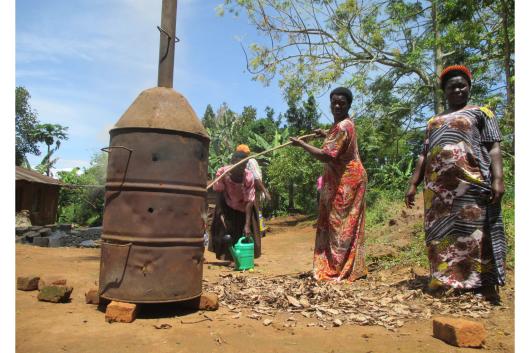In the month of International Women’s Day, this editorial reflects on an central issue for WRM: feminism within struggles for forests.
In light of this subject, we must ask ourselves: What do we mean by feminism? First of all, we must recognize that there is not just one, but rather many, feminist perspectives. And within this plurality, struggles that embrace common causes become woven together—especially in the Global South—as they seek to break from the systemic violence exerted on women’s bodies and their territories.
Women experience extreme situations when they confront the oppressions of racism, imposed poverty and coloniality (1). In order to expand, capitalism requires the oppression of women, in particular that of black and indigenous women. It seeks to subjugate those who are essential pillars of community life, ancestral knowledge, caretaking work and the reproduction of life. Capitalism is patriarchal. And racism and coloniality, in turn, sustain capitalism, enabling it to deepen its oppression over territories.
Women and their communities are fighting to sustain and reproduce collective life. Capitalism, meanwhile—with its extractive projects and ‘carbon offset’ projects that uphold extractivism—destroys forests and the histories of forests; poisons; divides into concessions what before was seen as inseparable; and criminalizes and destroys the interconnected web of life. Capitalism also exploits bodies, especially those of women and girls—who, in addition to suffering from labor exploitation, also suffer from sexual harassment and violence. To this end, racist and patriarchal capitalism is also sustained by institutional violence: courts, police stations and health clinics that support the impunity of these crimes.
Women workers facing up to the PalmCi oil palm plantation company in Côte d’Ivoire said in an interview, “I can assure you that women are very useful [to the company]. Harvesting fruit all day long with no rest, day after day, for years. (…) The companies overexploit women in order to make a profit. That is what is happening.”
Meanwhile, Rassela Malinda shares stories from women in Papua, Indonesia, who are facing the imposition of industrial palm plantations. In her article, she explains that these plantations “are one of the most unsafe places for women, not only because of women’s vulnerable employment status—mostly as casual laborers—but also because of the potential for sexual violence that lurks within and around the plantations.”
Likewise, women from Côte d'Ivoire reported that “women are victims of physical and other kinds of abuse. They are beaten and unjustly accused, as a pretext to demand favors from them. There is also sexual abuse, but this is kept quiet. They are told: ‘I saw you on our plantation stealing fruit. Take care of me and I’ll take care of you.’ What they mean is: ‘I’ll let you leave with the fruit if you have sex with me’ (…) Nobody has been punished for these crimes, despite the broken arms and traumatized girls and women. These crimes remain unpunished because the law of the jungle reigns.”
The oppressive patriarchal system is also apparent in governmental laws as well as customary laws—which often grant men most of the power over property and decisions regarding land. The same thing occurs when companies come to communities to try to get people to sign contracts: they almost always use strategies that reinforce male leadership, and they organize meetings with men only.
Flávia, an activist leader from a quilombola community in Sapê do Norte, Brazil shares her experience of the struggle to reclaim her community’s land and water sources: “Women have to be activists, mothers, homemakers. (…) We also suffer from prejudice for being black, quilombola, poor, farmers and women. Generally, the company underestimates us a lot. They think that ‘this woman isn’t capable of participating in a negotiation process,’ which means I constantly have to be asserting who I am” (2).
Meanwhile, Aminata Massaquoi, a member of the Informal Alliance Against Industrial Oil Palm Plantations in West and Central Africa, told us in an interview about the situation of rural women with a customary marriage in Sierra Leone: “If the man dies, or if a woman wants to dissolve the marriage due to domestic violence, she might not have rights to the land that she has worked on for years. In this case, her husband’s family could expel her from the land. (…) If a woman is married, she dare not speak or make decisions in the presence of her husband. As a result, empowered women, or women who are aware of their rights, run the risk of suffering violence within their homes, due to insubordination.”
Consequently, feminist struggles are also carried out within the territories, communities and families themselves. On several occasions, women have expressed the importance of having their own space—just for women—where they can come together, organize and understand the different forms of violence that exist within community spaces.
Guadalupe Núñez Salazar, coordinator of The Network of Coastal Women in Rebellion in Chiapas, Mexico, tells us in an interview about the importance of these spaces to be able to talk—not only about the impacts of palm in their territories, but also about the violence against their own bodies. She says, “Working in organizational processes of resistance in many cases also means confronting our own partners. Together we can see ways to move forward and keep fighting. Being able to hug one another and cry together helps us strengthen our collective voice.”
Feminist voices in territories are getting louder and louder. Feminist struggles place life at the center and show that in order to defend lands and forests, we must transform power relationships.
(1) The concept of power coloniality refers to the current perpetuation of colonial bases that sustained the formation of the capitalist order.
(2) Quilombola communities are those formed by Afro-descendent people who were subjected to slavery and who escaped to found quilombos in Colonial and Imperial Brazil.
